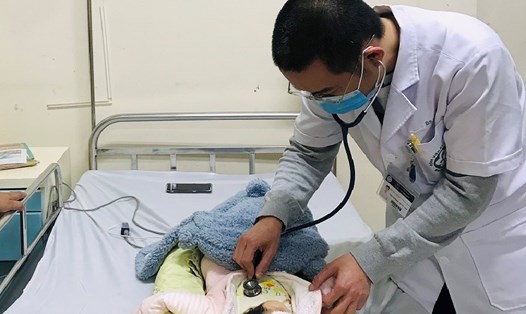Hoan My Cuu Long Hospital said that it has just successfully treated congenital heart disease with multiple holes in the atrial septum for patient N.H.A (15 years old, Binh Thuy district, Can Tho city).
Previously, A was discovered to have congenital heart disease through the hospital's monthly free screening program. Family members said that since childhood, A often complained of fatigue and difficulty breathing when exerting himself.
Through a thorough examination and the results of specialized tests at the hospital, doctors diagnosed A with congenital heart disease, an atrial septal defect with multiple holes in the atrial septum. After consultation, the team of doctors agreed to apply a minimally invasive heart surgery method with a small incision to patch the atrial septal defect with pericardium.
The surgery needed to be performed as soon as possible, but the patient's family was having difficulty because the cost was up to 102 million VND. In that situation, Hoan My Cuu Long Hospital coordinated with local authorities to guide the family through the procedures to request support from charitable organizations. Thanks to that, the entire surgery cost was promptly shared.
The surgery was successful within 1 hour. About 48 hours after the surgery, the patient's health condition was good, vital signs were stable, and test results were normal. The patient was discharged after 7 days of treatment and outpatient follow-up as scheduled by the doctor.
According to statistics from the Ministry of Health, each year, Vietnam has 8,000 - 10,000 children born with congenital heart disease and up to 50% of children with serious illness come from poor families. Congenital heart disease is very dangerous but can be completely cured if timely intervention or surgery is performed.
Dr. Tran Phuoc Hoa, Head of the Department of Cardiovascular - Thoracic - Cardiac Resuscitation, Hoan My Cuu Long Hospital, said: “The hospital has successfully treated and intervened in many congenital heart surgeries, but we realize that late detection of the disease is still a big challenge. Many cases are detected when the disease is already in a severe stage, missing the golden time for intervention, making the treatment process more complicated and prolonged. In the long term, congenital heart defects, if detected and intervened late, will lead to complications such as irreversible heart failure or incomplete recovery after intervention, or beyond the indication for intervention...”.
Accordingly, Dr. Phuoc Hoa advised parents to take their children to be examined and screened for congenital heart disease at least once in their lifetime. Early detection of congenital heart disease helps provide better care methods, with active and specialized treatment directions to help improve treatment effectiveness, protect children's health, and avoid serious complications later on.











